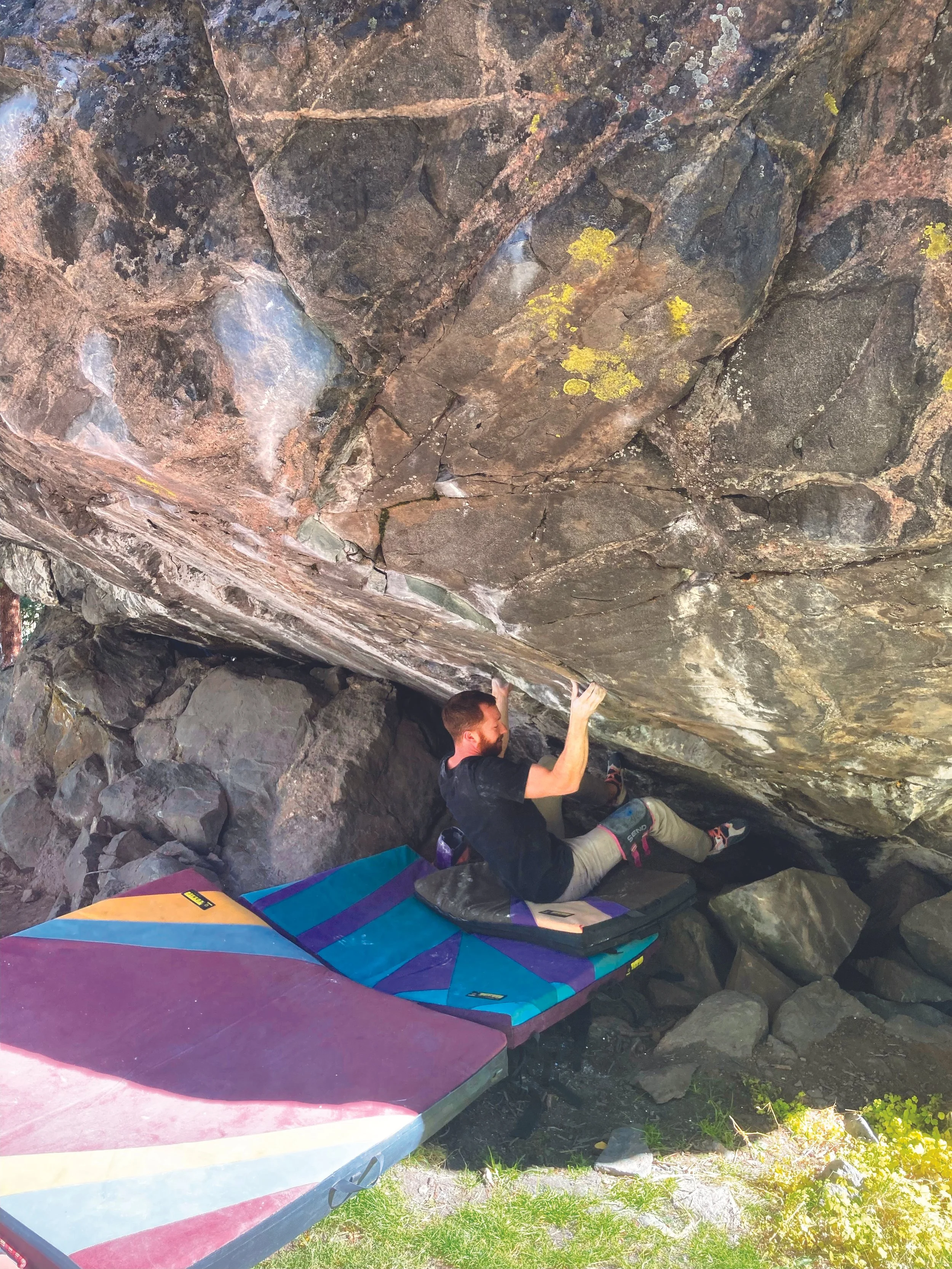Athlete Profile: David Becker Climbs V12
Photo courtesy of David Becker
Eagle County-based climber David Becker recently achieved the kind of athletic milestone that won’t ever get the recognition that it deserves. Unlike endurance sports such as running and cycling, where even those who don’t have insider knowledge will understand the value of placing well in a race, outdoor climbing doesn’t have the same relatability. There are no competitions to earn notoriety, no medals to wear, no podium to stand on. Most of the time, it’s just a couple people taking turns pulling on minuscule edges and dimples of rock with nothing but a phone camera on a makeshift tripod to capture the moment.
Ultimately, that’s the way most climbers want it. We tend to be aloof creatures who don’t necessarily seek out the spotlight. At the same time, these understated accomplishments take an enormous amount of effort and commitment — not only while climbing but in all of life’s adjacent aspects as well. Climber or not, journeys like Becker’s are worth appreciating.
This Eagle local completed his first V12 boulder this past year. In case that number doesn’t mean anything to you, it’s a standard that less than 1% of climbers will reach in the sport. The fact that he’s far from a full-time athlete and lives in a town smothered by snow for half the year makes the accomplishment all the more remarkable. The feats of professional athletes who make a living from their sport, while impressive, often lack relatability. They have scant other responsibilities to worry about besides training, recovering and performing at their peak.
But that’s not Becker’s situation. He’s your typical 9-to-5 worker bee who has figured out his keys to exceptional time and energy management. Becker credits the expertise of his coach, Robyn Fog, for helping him prioritize efficiency in his climbing training. He recognizes that “being able to hire a coach is a privilege.” But he also believes that “very few greats made it to where they are without a coach, or at least a mentor of some sort, who could keep them on track doing the things they needed to do to reach a lofty goal,” especially for those who don’t have unlimited opportunities to muck through the trial and error required to figure things out alone.
With Fog’s support, Becker determined three main areas of focus that sent the quality of his climbing skyrocketing: building a strong foundation, pinpointing weaknesses and creating consistency. As he sees it in retrospect, Becker says he used to spend most of his time fighting above his weight. “Failure is good sometimes,” he shares. “It keeps you fighting and learning, but the majority of the time, you need to succeed to progress.” He believes failure builds confidence and that generates momentum.
So in what seemed like a counterproductive move at first, Becker dialed back his efforts until he found himself sending more than flailing. He also shifted some of his training away from the climbing wall and into the weight room to round out his base of physical strength. Both approaches allowed him to build a more robust foundation that translated to increased confidence and resilience on his hardest climbs.
But to work on the hardest climbs effectively, Becker needed to learn how to identify — and actually improve — his weaknesses. “We all hate doing it,” he admits, “and I ignored these things for a long time.” He shares that he got to the point where he couldn’t even figure out what exactly he struggled with because he’d gotten so out of touch with that side of himself.
Through fresh eyes, Fog managed to identify the low-hanging fruit that would help balance out Becker’s set of climbing skills. Not only that, but she kept him accountable to doing the work required to go beyond noticing them and into actually improving them. “I don’t like disappointing the people who are cheering for me,” Becker laughs, so the knowledge that Fog would be asking him how things were going on a regular basis kept him chugging along through the discomfort.
Having Fog as an external source of accountability helped Becker realize one of his greatest strengths: consistency. As Becker says, “[I] may not be the strongest or the most technically gifted, but consistency is something I can do well ... without consistency,” he’s noticed, “everything else kind of falls apart for me.”
For Becker, consistency doesn’t come just in the form of a regular training schedule. It also includes having a set warm-up routine that grounds him in the present moment, mentally rehearsing his climbing project every night before bed, setting actionable goals for every climbing session and systematically prioritizingthe specific demands of his climbing project above all else. “There’s this saying: ‘Do the most important thing first,’ and I try to adhere to that every day,” explains Becker. The practice helped him, “sift through all the BS ” as he puts it, and focus on a few essential tasks that would generate momentum from there.
Becker pulled all of these pieces together with a monumental send of Rhythm of the Saints, a V12 boulder problem near Red Cliff. The climb wasn’t one that he would have picked for himself a few years ago. “I thought the first V12 I would climb would be some heinous, tension-dependent and crimp-heavy problem,” he muses, “but after two years of working weaknesses, the compression boulder with a massive move at the end felt within reach.” In other words, Becker surprised himself by picking a boulder problem that catered to the exact opposite of what he would have considered his style in the past.
Becker’s journey, which is far from over, shows that there’s no better sign of true growth than turning a shortcoming into a strength.
Originally published in the Summer 2024 issue of Spoke+Blossom.

